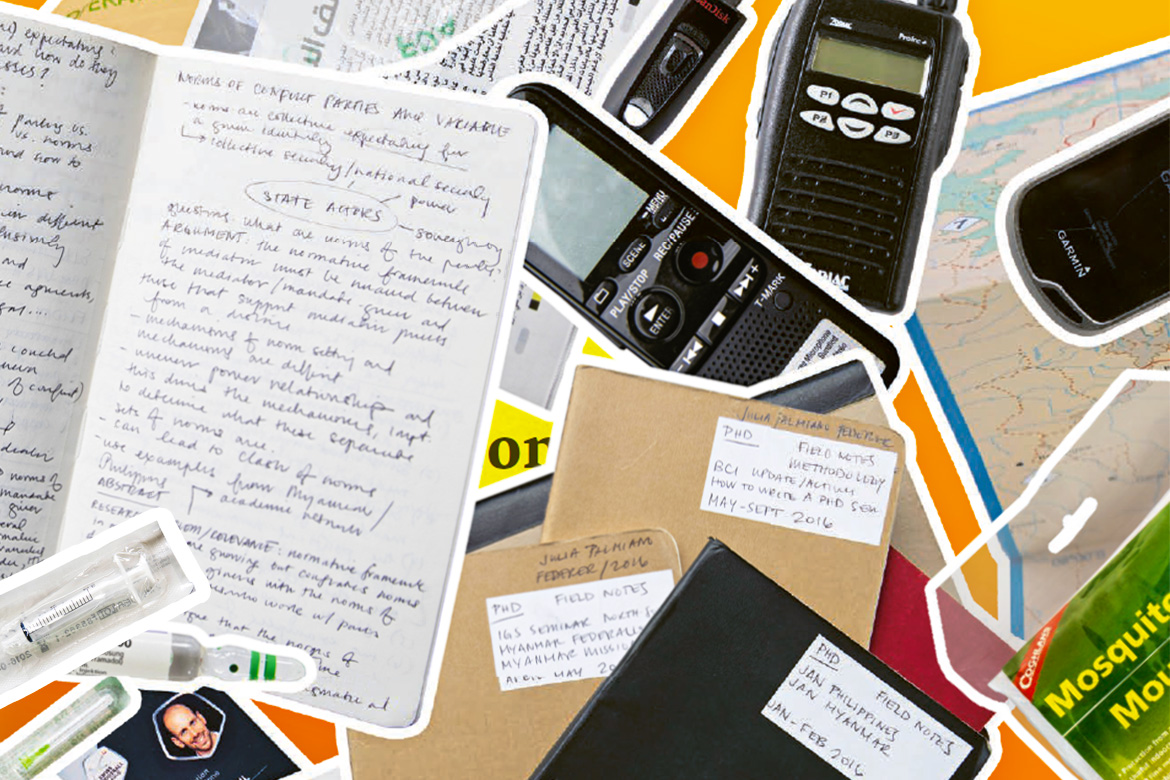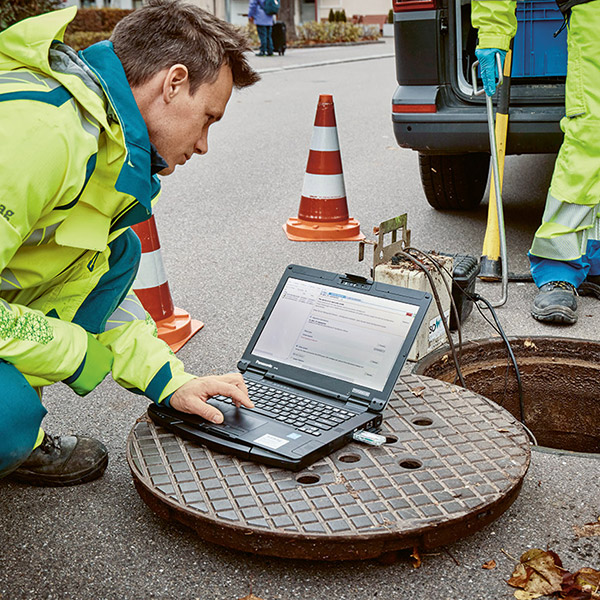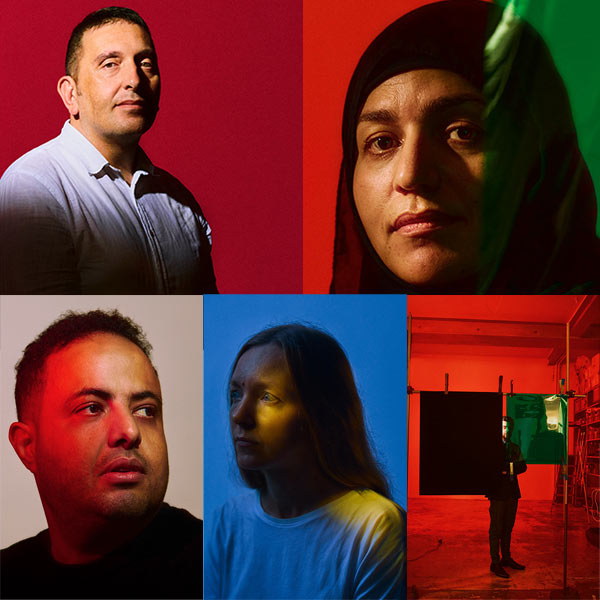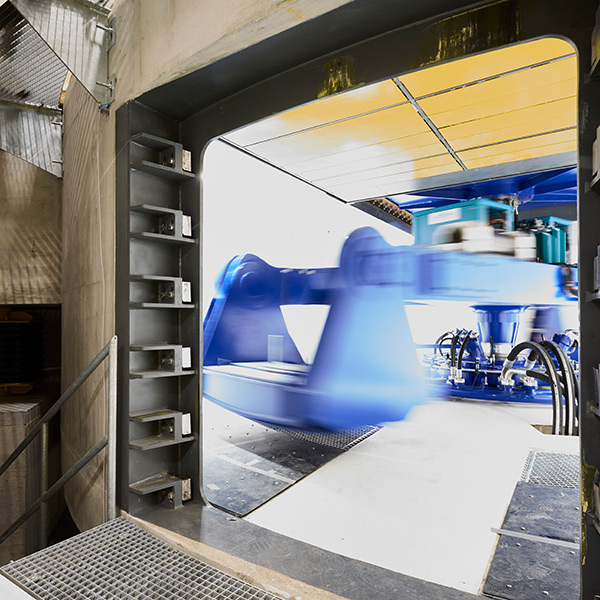Feature: Feature
Safety in the field begins at home
Visits to risk zones are never completely free of danger. But institutions are also legally obliged to ensure the safety of their employees out in the field.

Research in crisis zones. How much danger is knowledge worth? | Collage: 2. stock süd, Photos: Valérie Chételat
It’s the nightmare of every organisation that’s active in conflict zones or areas of heightened risk. In 2012 not far from a refugee camp in the east of Kenya, armed men ambushed a convoy of the Norwegian Refugee Council (NRC), an aid organisation. Their driver died, and other NRC workers were injured and kidnapped. This case caused a stir, not least because a Canadian employee of the NRC later filed a complaint against his organisation for gross negligence. After his return home, he had suffered from post-traumatic stress and was unable to work. The NRC admitted shortcomings in its planning for the mission. When the two parties failed to reach a settlement, a Norwegian court awarded the man in question compensation equivalent to some CHF 500,000.
“This court case startled the NGO scene, and sensitised them to the problem”, says Daniel Glinz, a coach, trainer, and longstanding delegate of the International Committee of the Red Cross (ICRC). Since 2015, he has been working as an advisor to ‘cinfo’, the Center for Information, Counselling and Training for Professions relating to International Cooperation, which is based in Biel. A cinfo working group (Swiss Security Network@cinfo) has now developed a tool to help Swiss NGOs and research institutions assess, monitor and improve their security and risk management processes: the Duty of Care Maturity Model (see box Tools for security).
Already back in 2011, a study by the Geneva Centre for Security Policy (GCSP) concluded that international organisations don’t only bear a moral and ethical responsibility for the well-being of their employees, but are also subject to legal norms regarding their duty of care and liability.
- Duty of Care Maturity Model : This is a learning tool developed by cinfo regarding an employer’s duty of care according to the Swiss Code of Obligations. It highlights the following four fields of activity: information, prevention, monitoring and intervention.
- Itineris: This FDFA platform enables Swiss citizens to register their foreign travels. They then receive a message if the security situation unexpectedly deteriorates seriously.
- BSAFE: This interactive online training course of the United Nations makes users aware of UN security standards.
Avoiding tricky situations
One of the members of the cinfo working group is Alexander Knup, the travel safety manager of the Swiss Tropical and Public Health Institute (Swiss TPH). He advises some 350 to 400 scientists and employees every year who are out and about in one of the nearly 300 Swiss TPH projects underway in more than 100 countries. According to Knup, there hasn’t been any large-scale security incident in recent years. If employees are travelling to a region where tensions are to be anticipated, it is possible that a project station will remain unmanned for several weeks when deemed necessary. That was the case in advance of the elections in the Democratic Republic of the Congo, for example.
Security precautions begin before the journey, and they all feature on a Swiss TPH checklist. Everyone travelling abroad has to take an online security awareness course run by the United Nations. All employees travelling to places where there are risks also have to take a two-day course with cinfo. It’s important for all travellers to register every journey personally on the web portal of the travel insurance company and on the Itineris platform of the Federal Department of Foreign Affairs (FDFA). And it’s also vital to engage in a regular, personal exchange of information.
Knup insists that it’s important to become acquainted with local circumstances and to develop a good network on the spot. This means that you will be able to rely on local help, if needs be. “If people on the spot accept you properly, this can do a lot to ensure your safety”. In an emergency, employees have access to a 24-hour hotline. There are also established protocols and areas of responsibility, in case a crisis occurs.
Researchers avoid high-risk zones
The interdisciplinary Centre for Development and Environment (CDE) of the University of Bern also regards putting down local roots as essential. Its researchers carry out some 100 project visits to developing countries every year, two thirds of them in countries that are experiencing conflict. “But we don’t go to high-risk zones”, explains Tanja Berger, the head of strategy and processes at the CDE. They don’t prescribe safety courses, but they prefer people to take them. Berger says that their prime concerns are providing personal advice and ensuring debriefings with the project head or the head of section. Researchers travelling abroad are also given guidelines on safety out in the field. They are required to register with the Itineris portal of the FDFA, and partner organisations offer support on the spot. In more complex crisis situations, they have recourse to the knowledge of the federal authorities – either the FDFA or the Swiss Agency for Development and Cooperation (SDC). “But luckily, we’ve never had such a case up to now”.
At the peace research institute Swisspeace, all the procedures, roles and responsibilities relevant to safety are regulated by the Safety and Security Guidelines introduced in 2018. There is a mandatory procedure to be carried out before embarking on a journey, which involves a risk assessment and going through a checklist with one’s line manager. “The briefing is adapted, depending on the risk assessment”, says Maria Hoffstetter, the HR manager. Just like at Swiss TPH, the standard procedures include the UN’s online security awareness training course. Where necessary, face-to-face training is also carried out, so travellers can practice how to behave at checkpoints, for example.
Research visits are never without risk. But the precautionary measures taken by some research institutions prove that they are not just ready for crisis situations – they’re also doing their best to make sure they never actually happen. Because careful planning is at the heart of all professional security management.
- “These days, we’re more interested in experiences than in things”
- There is strength in preserving beauty
- Editorial: I too am a tourist
- “Tourism is the industry of beautiful appearances”
- When tourism becomes a burden
- Curtain up on the theatre of dreams!
- Gadgets for near and far
- And the winner is . . .
- When failure is a seal of approval
- Until only the best remains
- Image series: No end to evaluating
- In the beginning was subjectivity
- We can’t get no satisfaction
- To give is nobler than to receive
- Funny money
- Trading places
- Machine authors
- “Perhaps AI will one day write a better paper than I can”




